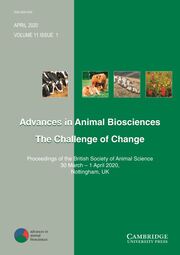Article contents
An uncertainty-based comprehensive decision support system for site-specific crop management
Published online by Cambridge University Press: 01 June 2017
Abstract
This paper presents a framework for the implementation of a decision support system that considers spatial, temporal and managerial factors in assessing the potential impact of crop amendments on the cost of a given production scenario. The proposed system includes a database and a numeric simulation model. The database is linked to previously recorded crop responses for a given agricultural input under different conditions while the numeric simulation model determines the probability of different levels of profit for each decision option. This system then determines the optimal uniform rate of application of an amendment to maximize profits, or to define the range of such rates for a case of variable rate application. Uncertainty-based treatment of each model input allows for a balance between the potential results of under-application or over-application.
- Type
- Information and Decision Support Systems
- Information
- Copyright
- © The Animal Consortium 2017. This is a work of the U.S. Government and is not subject to copyright protection in the United States
References
- 2
- Cited by


